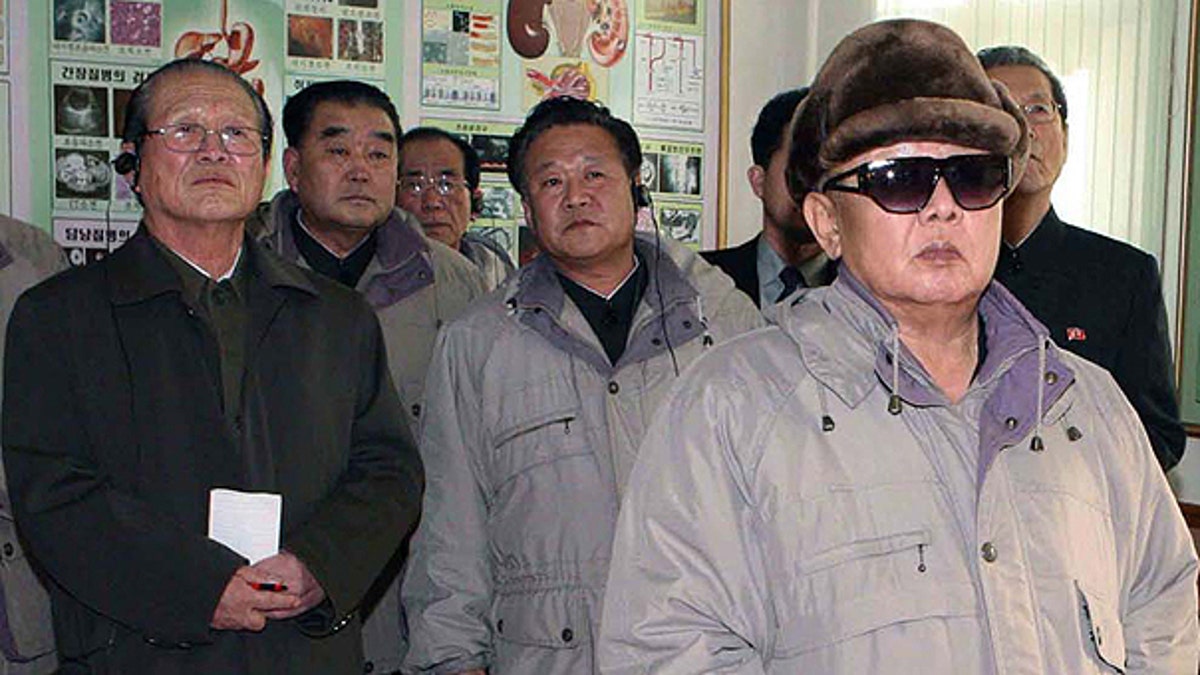
Nov. 24: In this undated photo by Korean Central News Agency via Korea News Service, North Korean leader Kim Jong Il visits a medical school in Pyongyang, North Korea. (AP)
SEOUL, South Korea – North Korea's parliament praised progress in building the economy and approved a handful of government appointments Thursday but state media made no mention of a major promotion for the son of leader Kim Jong Il.
Delegates to the Supreme People's Assembly convened a spring session in Pyongyang amid speculation that heir apparent Kim Jong Un would be elected to the powerful National Defense Commission — a move that would further solidify the young man's standing as North Korea's next leader.
However, there was no mention of the son in dispatches from the official Korean Central News Agency or footage of the parliamentary session in an evening newscast on state TV.
North Korea's parliament typically meets once or twice a year to rubber stamp bills vetted by the ruling Workers' Party, and outsiders scrutinize the sessions for clues to changes to the tightly controlled country's economic policies and power structure.
Thursday's session was North Korea's first major national meeting since Kim Jong Un made his political debut in September by taking on a key leadership post in the Workers' Party. Since then, he has appeared regularly at Kim Jong Il's side, his father's clear choice among three sons as heir apparent.
Analysts say election to the National Defense Commission, which formulates key state and military policies, would be the next step in the path to formally naming him as successor. The commission's No. 2 post, first vice chairman, has been vacant since November.
Kim Jong Il himself was elected by parliament 18 years ago to be chairman of the commission — a position that makes him the nation's leader under North Korea's constitution.
However, some analysts said it was unlikely the young, inexperienced Kim Jong Un, believed to have turned 28 in January, would be appointed to such a high-profile post while his father remains in control.
"Like Libya's Gadhafi and Cuba's Castro, he won't hand over all key power (to his son) until his death," said Jeung Young-tae, an analyst with the government-funded Korea Institute for National Unification in Seoul.
He said Kim may be gaining confidence that his health will hold up. Kim, 69, appears to have recovered from a stroke he reportedly suffered in 2008. Jeung said he may also worry about the backlash if the son gains power too quickly.
Since his debut in September, the son has steadily risen in prominence in state media, with his name appearing second only to his father's in a report Thursday about a visit to factories in the city of Kanggye.
Appointments approved Thursday at Mansudae Assembly Hall included the naming of a new security chief, Ri Myong Su, a four-star general who is a department director at the National Defense Commission. Ri replaced Ju Sang Song, who was dismissed last month.
Delegates also heard reports about the development of North Korea's light industry sector. The country has made it a key goal to build up the economy by 2012, the 100th anniversary of the birth of national founder Kim Il Sung.
Premier Choe Yong Rim said the North has built a new steel factory, increased coal industrial capacity and built hydropower stations, according to KCNA. Choe said the North will push for more progress in light industry, grain production, coal production and other fields, the report said.
In Pyongyang, Professor Han Sok Bong of the Institute of Legislation of Academy of Social Sciences, said the budget adopted Thursday reflects the nation's drive to improve economic conditions.
"It actively encourages the struggle for the improvement of the people's living standards, marking the 100th anniversary of the birth of our fatherly leader Kim Il Sung in 2012, next year," he told AP Television News. "I think it has been adopted in a realistic way to guarantee financially the people's economic plan for this year to be over-fulfilled ahead of schedule, vigorously accelerating the struggle for the building of a great, powerful and prosperous socialist nation."
North Korea, which has relied on outside food aid since the 1990s, has been seeking in recent years to revamp and revitalize its economy. The World Food Program said last month that more than 6 million North Koreans were going hungry in the wake of heavy flooding and a harsh winter.
Tensions over its nuclear and missile programs, and military saber-rattling, have prompted some nations and agencies to cut aid and impose sanctions. Since 2009, North Korea has launched a long-range rocket, tested a nuclear bomb and revealed a secret uranium enrichment program that would give it a second way to make atomic weapons.
Pyongyang has also been accused of two attacks last year that killed 50 South Koreans.
Gen. Walter Sharp, chief of 28,500 U.S. troops stationed in South Korea as a legacy of the 1950-53 Korean War, said he worries that the leadership succession could prompt North Korea to launch more attacks on the South over the next few years.
He told legislators Wednesday in Washington that U.S. and South Korean forces are prepared to respond militarily.
___
Associated Press writer Matthew Pennington contributed to this report from Washington.







































